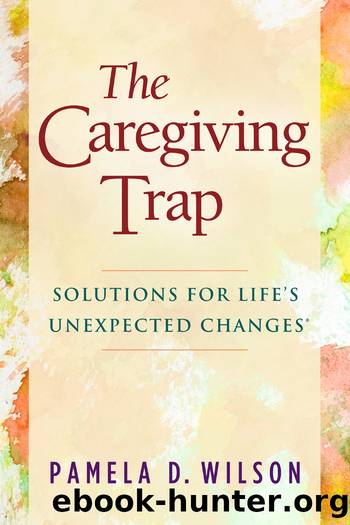The Caregiving Trap by Pamela D. Wilson

Author:Pamela D. Wilson
Language: eng
Format: epub
Publisher: Morgan James Publishing
Aging and Change
If all of a sudden your spouse, family, or friends disappeared and you had to start all over again, how would you respond? Would you mourn the loss and immediately take practical steps to replace your previous social supports and daily routines? Would you feel excited and view this change as an opportunity to start all over again with a clean slate, minus past history and mental baggage? Knowing what you know today, how might you refashion your life to be more of what you want?
How you respond to the question of starting all over again is a combination of your lifelong experiences, abilities, interests, education, problem solving, personal values, and social connections. Rarely do individuals step back and examine the actions that resulted in the life experience of today. Even fewer have the insight to identify behavior patterns that may have resulted in poor health or poor family relationships. If you are unhappy with the present situation, do you keep repeating the same behaviors over and over and over again, hoping to experience a different result? Many people fall into this trap of repetition.
When life situations are not as we wish and we are in a rut of repetition, some type of catalyst must enter the situation to facilitate change. This catalyst is a change that we initiate or a change initiated from the outside. When unexpected events occur, how we react and the way in which we respond is within our personal choice and totally within our control. We are, in a sense, given the opportunity to respond positively or negatively to change. Acceptance of change is more readily accepted by younger adults and adult children caring for older parents than by the older parents.
For younger adults, the idea of starting all over again in response to a change may seem like a great adventure. Many younger adults frequently initiate change by changing jobs or relocating to another city for a fresh start. Others look forward to marriage and raising children.
As an adult child, your life may have existed in the safety of a protected bubble until you were thrust into a situation where parent care was neededâparents in poor health now needing care and who failed to save for retirement. While changes that must be made by your parents are crystal clear to you, these changes may be resisted or even denied by your parents.
For older adults in their sixties, seventies, or eighties, the idea of change may be intimidating or even frightening because of a declining ability to cope, problem solve, and manage change. For many older adults the first significant change relating to the aging process involves retirement. While many dream of golden retirement years, the real transition, voluntary or involuntary, significantly affects life satisfaction.
Even for individuals who plan retirement, there is a loss of identity as many individuals associate their identity with career responsibilities. For those who retire involuntarily, life transitions like health related declines or the loss of a spouse may be linked to the onset of depression.
Download
This site does not store any files on its server. We only index and link to content provided by other sites. Please contact the content providers to delete copyright contents if any and email us, we'll remove relevant links or contents immediately.
Should I Stay or Should I Go? by Ramani Durvasula(7667)
The Lost Art of Listening by Michael P. Nichols(7506)
The Rosie Project by Graeme Simsion(6414)
Beartown by Fredrik Backman(5754)
We Need to Talk by Celeste Headlee(5615)
Ego Is the Enemy by Ryan Holiday(5450)
Hunger by Roxane Gay(4928)
Suicide Notes by Michael Thomas Ford(4827)
I Love You But I Don't Trust You by Mira Kirshenbaum(3876)
Mummy Knew by Lisa James(3693)
Not a Diet Book by James Smith(3427)
Crazy Is My Superpower by A.J. Mendez Brooks(3400)
Toxic Parents by Susan Forward(3292)
Girl, Wash Your Face by Rachel Hollis(3282)
The Complete Idiot's Guide to Coping With Difficult People by Arlene Uhl(3149)
The Social Psychology of Inequality by Unknown(3031)
Name Book, The: Over 10,000 Names--Their Meanings, Origins, and Spiritual Significance by Astoria Dorothy(2987)
The Hard Questions by Susan Piver(2976)
The Gaslight Effect by Dr. Robin Stern(2794)
